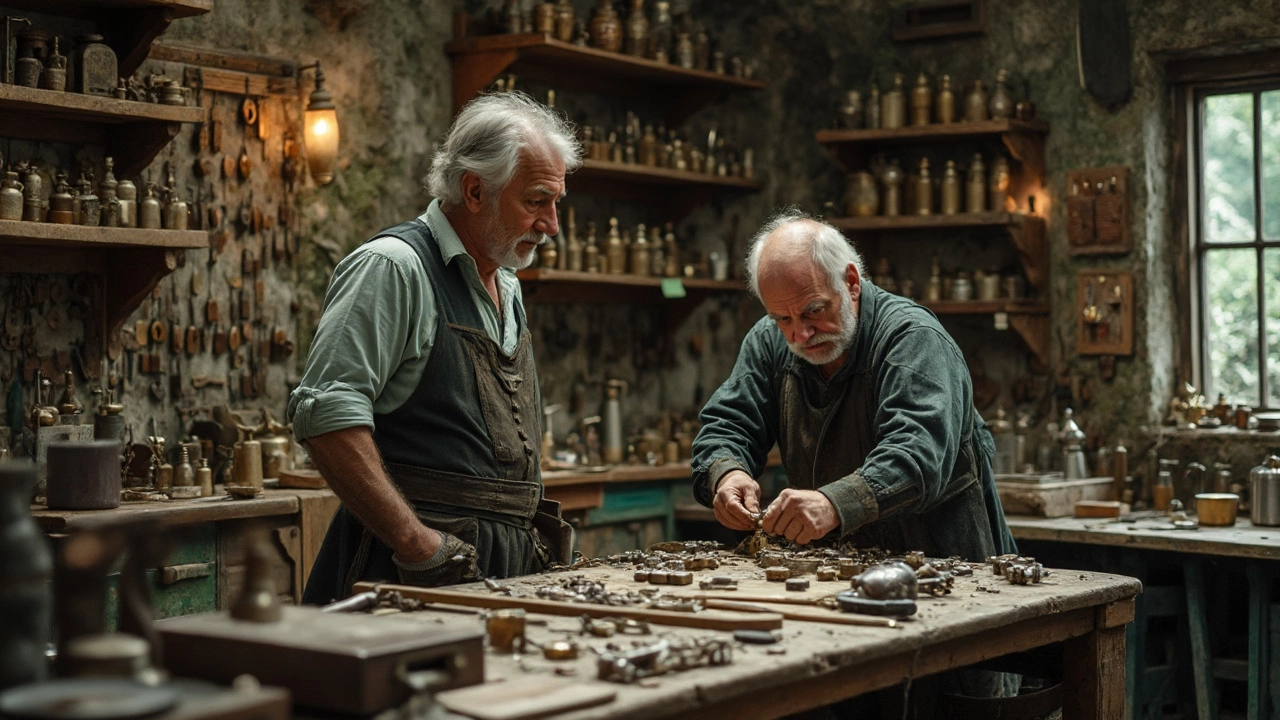How to Become a Locksmith in Ireland: Your Essential Guide
Ever found yourself fascinated by how locks work? Well, you're not alone! Becoming a locksmith in Ireland isn't just a cool gig; it's a rewarding career with some serious perks. But before you imagine going all MacGyver with locks, let's get into what it really takes to be a locksmith.
First off, it’s more than just fiddling with keys and locks all day. A locksmith needs to be a bit of a techie, a bit of a detective, and a solid problem-solver. In Ireland, locksmiths also need to be a bit savvy about local rules and regulations – yes, there are rules about locks, who knew?
Now, you might be wondering, “Do I need some fancy degree or background for this?” The good news is, pretty much anyone can start this career, but it will take some training and skill-building. There's stuff you gotta know – like working with different locking systems (hello, digital locks!), dealing with security systems, and of course, how to keep everything up to code.
- Understanding the Role of a Locksmith
- Essential Skills and Training
- Certifications and Qualifications
- Finding the Right Training Program
- Tips for Starting Your Locksmith Business
Understanding the Role of a Locksmith
So, what's the day-to-day like for a locksmith in Ireland? It's definitely more exciting than just opening doors for people who locked themselves out. A locksmith handles a mix of tasks that range from fixing and installing locks to building advanced security solutions for homes and businesses.
First, let's tackle the basics. A locksmith is an expert in all things locks—not just door locks, but also things like safes, windows, and even vehicle locks. In this digital age, it's not surprising to find locksmiths working with smart locks and security systems too. Their skills are about ensuring safety and providing peace of mind.
Now, you might ask, what's all involved? Here's a quick rundown:
- Key Cutting and Duplication: This is one of the most common tasks. A locksmith crafts keys for new locks or duplicates existing keys with precision.
- Lock Installation and Repair: Whether it's a new security system installation or repairing an old, jammed lock, a locksmith ensures everything operates smoothly.
- Emergency Services: Locked out of your home at midnight? A locksmith often provides 24/7 emergency services.
- Security Consultation: In Ireland, homeowners might seek advice on securing their property. Locksmiths can assess potential security risks and recommend solutions.
Working as a locksmith is not just about handling tools. You also need a good head for problem-solving and patience, because sometimes locks don’t want to cooperate. Plus, with more properties going digital, you might find yourself learning about networked security systems. This means continuous learning is part of the job, but that’s what makes it cool!
Essential Skills and Training
Alright, so you're pumped to become a locksmith in Ireland. But what skills do you actually need? No worries, I’ve got the lowdown for you!
First thing you need is a knack for problem-solving. Ever tried getting into a locked door without a key? It's like a treasure hunt, but the treasure is getting inside! You need to figure out how different locks work and figure out what’s gone wrong or how to fix it.
Then there’s the technical side. Knowing how to use and handle locksmith tools like tension wrenches, pick sets, and key decoders is a must. And these days, you can't just stick to good old mechanical locks. With tech getting fancier, there are electronic and smart locks too. So get comfy with tech because it’s gonna be your new best friend!
A proper training course is a must to pick up these skills. Here’s where you’ll learn everything from the basics to advanced techniques. In Ireland, some programs offer different modules—ranging from identifying key types to installing and maintaining security systems. Many folks go for hands-on training programs so they can get their practice in and not just book smarts.
- Choosing the right locksmith training course is super important. Ensure the course is recognized and offers practical sessions.
- Take your time to understand local regulations. Knowing the laws keeps you on the right side of things!
- Stay updated. What’s trendy in lock security today might be history tomorrow. Continuous learning is key.
If you're wondering about the numbers, consider this: A reported 70% of Ireland’s locksmiths say on-the-job training is crucial for mastering real-world problems. Getting your hands dirty helps you rapidly pick up valuable skills!
Begin with these skills and the right training, and you'll be well on your way to unlocking a successful career as a locksmith in Ireland!

Certifications and Qualifications
So, you're all set on becoming the next big thing in the locksmith world in Ireland? First things first, let's chat about certifications and qualifications you'll need to get started.
Unlike some other careers, becoming a locksmith in Ireland doesn't require a formal degree. However, certification is key (pun intended) to establishing your credibility and expertise. This is crucial for gaining trust from clients and standing out in the field.
Start by enrolling in a locksmith course that’s recognized locally. These courses often cover the basics of locks, key cutting, and security systems. While there isn't a sole governing body providing certification in Ireland, many independent organizations offer valuable courses. Do some homework and ensure they're reputable, offering skills that employers value.
After getting some initial training, it's smart to aim for certifications from recognized bodies like the Associated Locksmiths of Ireland (ALI). Their programs provide a solid foundation and ensure you meet industry standards.
Let's not forget about staying up-to-date. Technology's always throwing us curveballs, especially in home security. Regularly attending workshops or webinars on the latest security systems is clutch. Some training companies even offer continuous education, making sure you’re always in the loop.
Lastly, while not mandatory, getting a security license can be a wise move. It shows potential employers or clients that you take security seriously. Plus, it might just give you that edge when starting your own locksmith business down the line.
Finding the Right Training Program
Diving into the locksmith world in Ireland means one big task: getting the right training. It's the backbone of becoming a pro at what you do. So, where do you even start looking?
First up, you'll want to make sure you choose a program that’s recognized in the industry. Look for courses that have a solid reputation and offer hands-on experience. The Irish Locksmith Organisation (ILO) often has recommendations for approved training programs.
When you’re picking a course, keep an eye out for a few key things:
- Comprehensive Curriculum: Your course should cover both traditional and modern locking systems. Think mechanical locks, digital locks, safes, and automotive locks.
- Practical Experience: Make sure there’s plenty of hands-on learning. You should be spending more time using tools than flipping through theory books.
- Certification: A program that offers a recognized certification could help you stand out in the job market. It adds a stamp of credibility to your skills.
It's also worth noting that some places offer mentorship opportunities where you work alongside seasoned locksmiths. Now, that’s a goldmine of knowledge you can't get from any textbook!
Make no mistake, some programs might seem pricey, but think of it as an investment in your career. Plus, with the growing need for security solutions, that investment can pay off pretty quickly. A typical locksmith training course can range from a few weeks to a couple of months, and many offer flexible hours to work around your schedule.
Once your training is complete, keep honing your skills. Every so often, toss in a workshop or a short course to keep updated with the latest in locksmith technology. Being a locksmith in Ireland is as much about staying current as it is about knowing the classics.

Tips for Starting Your Locksmith Business
Kicking off your very own locksmith business in Ireland? That’s pretty exciting! But before you jump in, there are a few things you should get sorted to keep things running smoothly. Let’s break it down into manageable steps.
First up, you need to get your certifications in order. In Ireland, you might not need a locksmith license like in some other places, but having proof of training and experience can really give you the edge. It's all about reassuring your customers and building trust in your skills.
Next, think about securing the right tools. Nowadays, locksmithing isn’t just about a good wrench and screwdriver. With technology advancing, having the latest gadgets, from key programmers to laser key cutters, can really set your business apart.
A quick word on marketing—don’t underestimate it! In today’s world, customers often go online to find services. Make sure your business is easy to find. Think about setting up a website and maybe even running a few ads to get your name out there. Remember, those keywords like "locksmith training Ireland" can be a game-changer for reaching the right audience.
- Set clear pricing: Customers love clarity, so make sure your pricing is transparent and competitive.
- Build a network: Networking with other tradespeople can lead to great referrals. Plumbers, electricians, and other contractors might send business your way.
- Continued education: Locksmithing technology is always evolving, so keep learning. Workshops, webinars, and online courses can keep your skills sharp.
- Customer service is key: People might forget what you did for them, but they'll remember how you made them feel. Responsive, helpful service can lead to repeat customers and referrals.
If you’re curious about the potential earnings and business costs, here's a snapshot to guide you:
| Item | Average Cost |
|---|---|
| Initial Tool Kit | €1,500 - €2,000 |
| Website Development | €500 - €1,000 |
| Marketing Budget (Monthly) | €200 - €500 |
| Training/Certifications | €300 - €700 |
Setting up shop isn’t just about getting out there and fixing locks; it requires some savvy business sense and a sprinkle of tech know-how. Just keep your focus, stay organized, and you’ll be picking the locks to success in no time!





